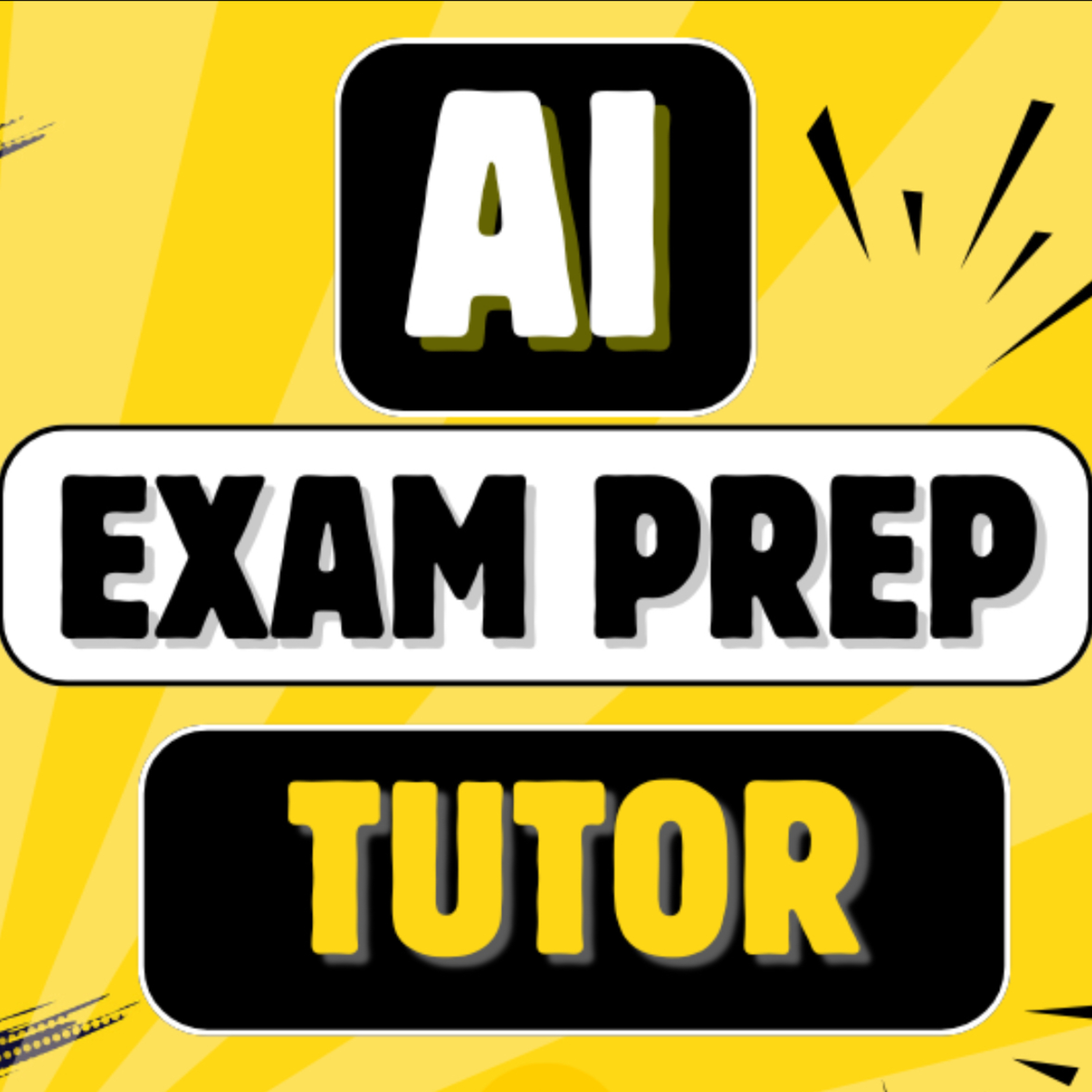The Art of Effective AI Prompting for Exam Success
Welcome to the blog! In this post, we're diving deep into the art of crafting effective prompts for AI study tools. Just like any powerful tool, AI is only as good as the instructions you give it. Learning how to ask the right questions is crucial for unlocking the full potential of AI and getting the most helpful and relevant information for your exam preparation. We'll explore real-world examples, practical techniques, and strategies for personalizing your study plan with AI. This blog post expands on the concepts we discussed in our latest podcast episode, "AI for Exam Prep: High Impact Tutoring #ai #aitutoring #aieducation." Give it a listen for even more insights and actionable tips!
Introduction: AI's Role in Modern Education
Artificial intelligence is rapidly transforming education, offering personalized learning experiences, instant feedback, and access to a vast repository of knowledge. No longer confined to science fiction, AI is now a tangible tool available to students of all levels. From generating practice questions to explaining complex concepts, AI has the potential to revolutionize how we learn and prepare for exams. However, the effectiveness of AI in education hinges on our ability to interact with it effectively. This means mastering the art of AI prompting – the skill of formulating clear, concise, and targeted questions that elicit the most relevant and helpful responses.
Think of AI as a highly knowledgeable, albeit somewhat literal, tutor. It can process information at incredible speeds and provide detailed explanations, but it needs clear instructions to understand your needs. Simply asking vague or general questions will likely result in generic answers that don't address your specific learning gaps. By learning how to craft effective prompts, you can transform AI from a simple information retrieval tool into a powerful personalized study companion.
Tommy's Experience: A Real-World Example
Let's consider the story of Tommy, a student preparing for a challenging certification exam. Initially, Tommy approached AI with a simple, broad question: "Explain the theory of relativity." The AI provided a lengthy explanation filled with technical jargon that left Tommy feeling more confused than ever. Frustrated, he almost gave up on using AI altogether.
However, after learning about the importance of effective prompting, Tommy changed his approach. He began to break down the theory of relativity into smaller, more manageable concepts. Instead of asking for a general explanation, he asked specific questions like: "What are the key differences between special and general relativity?" and "Can you provide a real-world example of how time dilation works?"
The results were transformative. By asking focused questions, Tommy received clear, concise answers that directly addressed his specific areas of confusion. He used AI to generate practice problems related to specific aspects of the theory and even asked it to explain the solutions step-by-step. Tommy's experience highlights the critical role of effective prompting in unlocking the true potential of AI for exam preparation. His initial frustration stemmed from treating AI as a magic bullet, rather than a tool that requires skillful use. By learning to craft targeted prompts, he transformed AI into a valuable study partner that helped him conquer a challenging subject and ultimately succeed on his certification exam.
AI as Your Personal Study Tool
AI offers a multitude of benefits as a personal study tool. It can provide instant access to information, generate practice questions tailored to your specific needs, and offer personalized feedback on your performance. Unlike traditional study methods, AI can adapt to your learning style and pace, creating a truly personalized learning experience.
Here are some specific ways AI can enhance your study routine:
- Concept Explanation: AI can explain complex concepts in a clear and concise manner, breaking down complicated topics into manageable chunks.
- Practice Question Generation: AI can generate a wide range of practice questions, from multiple-choice to essay-based, allowing you to test your knowledge and identify areas for improvement.
- Personalized Feedback: AI can provide feedback on your answers, highlighting areas where you need to focus your efforts.
- Study Schedule Creation: AI can help you create a personalized study schedule based on your exam date, available time, and learning style.
- Resource Recommendation: AI can recommend relevant articles, videos, and other resources to supplement your learning.
The key to unlocking these benefits lies in mastering the art of effective AI prompting. By learning how to ask the right questions, you can harness the power of AI to create a personalized and effective study plan.
The Core Skill: Effective AI Prompting
Effective AI prompting is not just about asking questions; it's about crafting prompts that are clear, concise, and targeted. A well-crafted prompt provides the AI with the context it needs to understand your request and deliver a relevant and helpful response. Here are some key principles to keep in mind when crafting AI prompts:
- Be Specific: Avoid vague or general questions. Instead, focus on specific concepts or areas where you need help.
- Provide Context: Give the AI enough background information to understand the context of your question. This could include the subject matter, the type of exam you're preparing for, or your current level of understanding.
- Use Keywords: Incorporate relevant keywords into your prompt to help the AI identify the specific information you're looking for.
- Define the Desired Output: Clearly state what you want the AI to do. Do you want it to explain a concept, generate practice questions, or provide feedback on your answers?
- Specify the Format: If you have a specific format in mind for the response, be sure to specify it in your prompt. For example, you might ask the AI to provide a step-by-step explanation or to generate a multiple-choice quiz with four answer options.
- Iterate and Refine: Don't be afraid to experiment with different prompts and refine your approach based on the AI's responses. The more you practice, the better you'll become at crafting effective prompts.
Let's look at some examples of how to transform a vague prompt into an effective one:
Vague Prompt: "Tell me about the American Civil War."
Effective Prompt: "Explain the main causes of the American Civil War, focusing on the economic and social differences between the North and the South. Provide specific examples to illustrate each cause."
Vague Prompt: "Give me some practice questions for my chemistry exam."
Effective Prompt: "Generate five multiple-choice practice questions on the topic of chemical bonding, covering concepts such as ionic bonds, covalent bonds, and metallic bonds. Include four answer options for each question and provide the correct answer key."
By following these principles, you can significantly improve the quality and relevance of the information you receive from AI, making it a much more effective study tool.
Unlocking AI for Test Preparation
AI can be a game-changer in test preparation, offering a range of tools and techniques to help you succeed. Here are some specific ways to unlock AI's potential for test preparation:
- Personalized Learning Paths: AI can analyze your strengths and weaknesses to create a personalized learning path that focuses on the areas where you need the most improvement.
- Adaptive Practice Tests: AI can generate practice tests that adapt to your skill level, providing increasingly challenging questions as you progress.
- Real-Time Feedback and Analysis: AI can provide real-time feedback on your performance, identifying areas where you're struggling and offering targeted recommendations for improvement.
- Content Summarization: AI can summarize lengthy articles and textbooks, helping you quickly grasp the key concepts and information.
- Flashcard Generation: AI can generate flashcards based on key terms and concepts, making it easier to memorize important information.
To make the most of these tools, remember to focus on crafting effective prompts. For example, instead of asking "Summarize this article," try "Summarize this article [insert article title/link] and identify the three main arguments presented by the author." This will help the AI focus its efforts and deliver a more relevant and useful summary.
Crafting a Personalized Study Plan with AI
One of the most powerful applications of AI in exam preparation is its ability to help you create a personalized study plan. By providing the AI with information about your exam date, available time, learning style, and areas of weakness, you can generate a customized study schedule that maximizes your chances of success.
Here's a step-by-step guide to crafting a personalized study plan with AI:
- Gather Information: Before you start prompting the AI, gather all the relevant information, including your exam date, the topics covered on the exam, your available study time, and your learning style preferences.
- Define Your Goals: Clearly define your goals for the study plan. What do you hope to achieve by using AI? Do you want to improve your overall score, focus on specific topics, or simply stay on track with your studies?
- Craft Your Prompts: Use the principles of effective prompting to craft clear and concise prompts that guide the AI in creating your study plan. For example, you might ask: "Create a study plan for the [exam name] exam, which is in [number] weeks. I have [number] hours per week to study. My strengths are [list strengths] and my weaknesses are [list weaknesses]. I prefer to learn through [learning style]."
- Review and Refine: Once the AI generates a study plan, review it carefully and make any necessary adjustments. Consider factors such as your energy levels, personal commitments, and any upcoming events that might impact your study schedule.
- Track Your Progress: As you follow your study plan, track your progress and make adjustments as needed. Use the AI to generate practice questions, assess your understanding, and identify areas where you need to focus your efforts.
By working collaboratively with AI, you can create a study plan that is tailored to your specific needs and preferences, increasing your chances of success on exam day.
Refining Your AI Interactions for Better Results
Getting the most out of AI study tools isn't just about writing good initial prompts; it's also about refining your interactions based on the AI's responses. This iterative process allows you to guide the AI towards providing increasingly relevant and helpful information.
Here are some key strategies for refining your AI interactions:
- Provide Feedback: If the AI's response is not what you were looking for, provide feedback to help it understand your needs better. For example, you can say "That's helpful, but can you explain it in simpler terms?" or "Can you provide more specific examples?"
- Ask Follow-Up Questions: Don't be afraid to ask follow-up questions to clarify concepts or explore related topics. This will help you deepen your understanding and identify areas where you need further clarification.
- Experiment with Different Prompts: If you're not getting the results you want, try experimenting with different prompts. Rephrase your questions, use different keywords, or provide more context.
- Use Examples: Provide examples to help the AI understand what you're looking for. For example, if you're asking the AI to generate practice questions, you might provide an example of the type of question you want it to create.
- Be Patient: It may take some time to learn how to effectively interact with AI. Be patient and persistent, and don't be afraid to experiment.
By actively engaging with the AI and refining your interactions based on its responses, you can unlock its full potential and create a truly personalized learning experience.
Navigating the Challenges of AI Exam Prep
While AI offers numerous benefits for exam preparation, it's important to be aware of the potential challenges and limitations. One key challenge is the risk of over-reliance on AI. It's crucial to remember that AI is a tool, not a replacement for critical thinking and independent learning. Relying solely on AI without actively engaging with the material can lead to superficial understanding and a lack of critical thinking skills.
Another challenge is the potential for bias in AI-generated content. AI models are trained on vast amounts of data, and if that data reflects existing biases, the AI may inadvertently perpetuate those biases in its responses. It's important to be aware of this possibility and to critically evaluate the information you receive from AI.
Finally, it's important to be mindful of the ethical implications of using AI for exam preparation. Avoid using AI to cheat or plagiarize, and always cite your sources appropriately. Remember that the goal of exam preparation is to learn and understand the material, not simply to get a good grade.
Final Thoughts: Maximizing AI for Exam Success
AI has the potential to be a powerful tool for exam preparation, but its effectiveness depends on your ability to use it strategically and responsibly. By mastering the art of effective AI prompting, you can unlock its full potential and create a personalized and effective study plan. Remember to focus on crafting clear, concise, and targeted prompts, refining your interactions based on the AI's responses, and being mindful of the potential challenges and limitations. Most importantly, use AI as a supplement to your own critical thinking and independent learning, not as a replacement for them.
We hope this blog post has provided you with valuable insights and practical tips for using AI to prepare for your exams. For even more in-depth discussion and real-world examples, be sure to check out our podcast episode, "AI for Exam Prep: High Impact Tutoring #ai #aitutoring #aieducation." Good luck with your studies!
Free Resources: Study and Prompt Guides
To further help you on your journey to exam success with AI, we're offering free study and prompt guides! These guides are designed to provide you with even more practical tips, examples, and templates for crafting effective AI prompts and maximizing your study efforts. Sign up for our mailing list at www.ftceseminar.com to get access to these valuable resources. We believe that with the right tools and strategies, you can unlock your full potential and achieve your academic goals.










